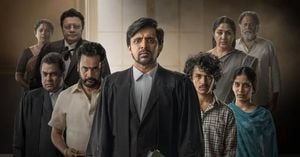The Netflix docuseries ‘American Murder: Gabby Petito’ has sparked significant debate following its release, particularly around the ethical ramifications of using artificial intelligence to recreate the voice of the deceased Gabby Petito. This controversy encapsulates the tension between storytelling and moral boundaries, especially concerning sensitive topics such as murder and tragedy.
Petito, 22, became the center of national attention following her mysterious disappearance during a cross-country road trip with her fiancé, Brian Laundrie, in September 2021. The couple, who documented their travels on social media, had been seen experiencing alarming incidents which were later examined, including interactions with police. When Petito was found dead, the ensuing investigation brought Laundrie under intense scrutiny as authorities labeled him a person of interest. Laundrie himself became the focus of investigations after disappearing, leading to his eventual death by suicide, during which he left behind a confession note.
The three-part series made its debut recently, featuring heartfelt interviews with Petito's loved ones, along with photographs, videos, and writing excerpts from Petito’s journals. The filmmakers, directors Julia Willoughby Nason and Michael Gasparro, included a disclaimer informing viewers about the use of AI technology to recreate Petito’s voice for her journal entries, aiming to present her narrative authentically.
While the filmmakers asserted they had received approval from Petito's family to use this technology, the viewer response has been mixed, with many expressing discomfort. Reactions on social media platforms reflect unease, with some users labeling the choice as “unsettling” and “deeply uncomfortable.” Videos circulating on TikTok have voiced similar sentiments, with one popular post stating the use of AI voice recreation felt like “a step too far.”
According to reports, Gasparro defended the filmmakers' approach, citing extensive material from Petito’s family as motivation to recreate her voice. He explained, “All of her journals since she was young and there was so much of her writing. She documented her trips and most of her life from a young age. We thought it was really important to bring [Gabby’s story] to life.”
Nevertheless, experts like Merve Hickok, president of the Center for AI and Digital Policy, have weighed in on the ethical dimensions of such representations. Hickok maintains the practice of voice cloning isn't inherently unethical, yet expressing caution about the potential misuse, especially when it involves deeply personal material. She emphasized, “A person made the decision to keep [content] private, and it is not up to us to make the decision on their behalf after they passed away.”
Petito’s family has not been without reservations themselves. Nichole Schmidt, Petito’s mother, shared her initial feelings, stating it felt “weird,” and even her stepfather, Jim Schmidt, reflected on how difficult it was to hear her voice, regardless of the method used to present it. “AI or her real voice, I still get upset hearing it knowing she’s gone,” he lamented.
Critically, the documentary raises important questions about how filmmakers portray individuals who can no longer speak for themselves. The strong emotional reactions signify the growing concern among viewers about the exploitation of AI technology, especially concerning narrations tied to tragedies like Petito’s.
Beyond the ethical debate around AI, the film has re-ignited discussions about the Laundrie family’s involvement and knowledge surrounding the murder. Brian Laundrie’s sister, Cassie Laundrie, has also found herself back under public scrutiny due to her family’s silence during the investigation. Following the film, she expressed dissatisfaction with her family’s handling of the situation but has not actively engaged with the media.
Addressing viewers amid this outcry for transparency, Joe Petito, Gabby’s father, revealed, “I reached out to Brian's parents and they just never responded,” underscoring the perceived lack of cooperation from Laundrie’s side during the investigation.
This Netflix docuseries continues to highlight the challenges of balancing respectful storytelling against the backdrop of advanced technology and ethical storytelling principles. While the allure of such innovations may offer new avenues of retelling poignant stories, they also evoke serious consideration about respect for the memories of those who can no longer share their voice.
The emotional weight of products like ‘American Murder: Gabby Petito’ extends beyond mere entertainment; they encapsulate real-world tragedies fraught with grief, complicity, and complex family dynamics. With public reception polarized, the documentary serves as both cautionary tale and case study of the moral dilemmas raised by contemporary digital storytelling.



